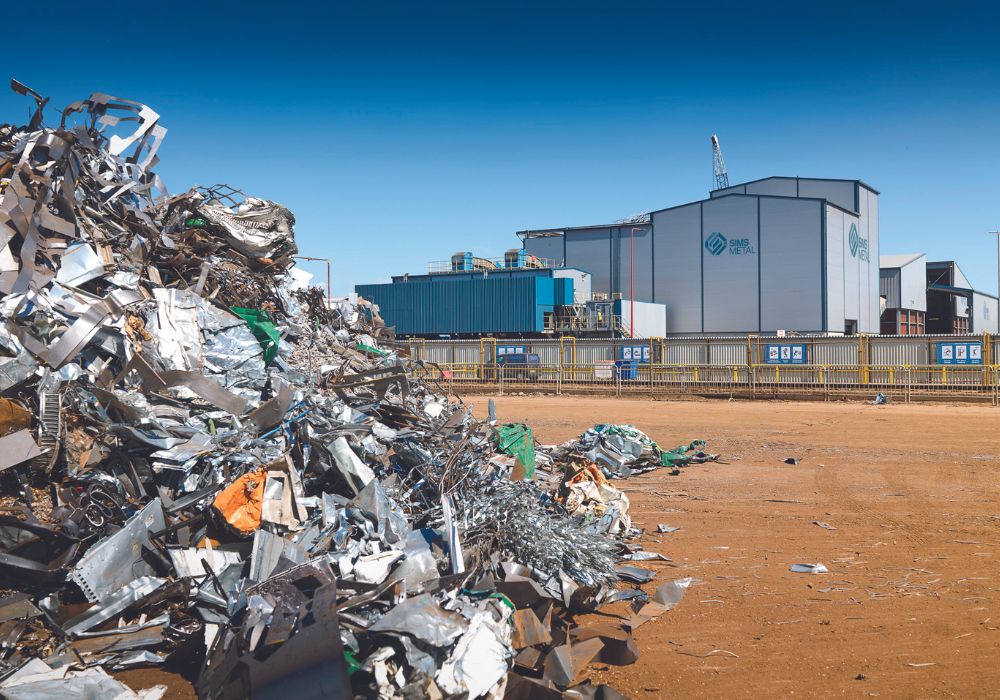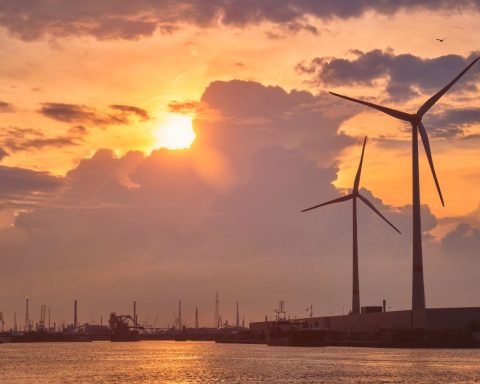The scrap metal industry, to upcycle a tread-worn cliché, don’t get no respect. Stephen Mikkelsen, CEO and managing director of Sims Ltd., the 106-year-old Australian recycling giant, points out that in conversations about climate and carbon, topics like renewable-energy investments and offshore wind farms tend to attract the lion’s share of the attention paid to problems and solutions.
According to Sims’s latest climate report, every tonne of scrap used for steel production avoids 1.5 tonnes of carbon dioxide emissions compared to producing steel from raw materials. The savings, Mikkelsen says, “are enormous” and added up to a savings of 13 million tonnes of carbon dioxide in 2023 alone – equivalent to removing almost three million gas-powered cars from the road for a year.
Mikkelsen also likes to say that Sims – the top-ranked firm on the Corporate Knights 2024 Global 100 list of the world’s most sustainable publicly traded corporations with more than $1 billion in revenue – is not a Johnny-come-lately to the circular economy in general and the business of decarbonizing steel in particular. “We weren’t late to this party,” he says. “We were sending out invitations 100 years ago.”
The iron and steel business is a major contributor to the climate crisis. Globally, this industry generates about 7% to 9% of all anthropogenic emissions, or about 2.6 billion tonnes per year, according to World Steel, an industry body. The sector, moreover, isn’t on track to achieve net-zero targets, despite investments in new forms of low-carbon energy for steel plants. As the International Energy Agency reports, “the current pipeline of low- and near zero-emission projects falls short of what is required to meet the [net-zero] scenario, and high-emission projects” – which is to say, coal-fired steel – “make up around two-thirds of all announced projects worldwide.”
Recycling scrap, in short, makes more sense than ever, although the process, which involves smelting and other energy-intensive processes, also needs to boost its environmental performance.
Among the firms operating in this vertical, Sims scores highly. It earned the top spot on the Global 100, with 100% sustainable revenue and clean investments, a 95% score on the energy productivity of its operations, and 87.5% on its carbon productivity. The company also ranks highly on a range of social metrics – low employee turnover, for example, and strong gender diversity at both the board and C-suite levels. Mikkelsen adds that the firm has pushed to reduce carbon in its own operations, setting a target of 2025 to transition entirely to the use of renewable energy in its shredding and separating operations, as well as longer-term goals, such as becoming carbon neutral by 2030 and achieving net-zero emissions by 2050.

Its environmental track record is not, however, pristine. In 2022, a B.C.-based metal recycling firm in which Sims owns a stake was slapped with a provincial clean-up order related to the discharge of PCB- and heavy-metal-saturated effluent into the Fraser River; the company is fighting the order in court. The firm has also faced media scrutiny and regulatory action in the U.S. related to air pollution from one of its smelting facilities in the Chicago area. Sims’s 2022 sustainability report notes that the company has sought to comply with state environmental rules by investing US$15 million in an emissions-control system.
At a high level, Mikkelsen’s pitch to investors is that scrap metal – steel, copper, aluminum, et cetera – has a bright future in the low-carbon economy, thanks to steadily rising demand for electric vehicles, wind turbines, electricity transmission grids, solar panels. “All of those are steel intensive, copper intensive, aluminum intensive.” He points also to the steady growth in the number of metal recycling plants that are either coming online or in the planning stages, in the U.S., Canada, the U.K. and elsewhere. Even countries that traditionally exported scrap metal, like Japan, are building electricity-fired processing plants.
But the expansion of demand for recycled metals isn’t immune to market fluctuations. In the past year, global demand for copper has dropped, and the slowing of the Chinese economy has sent ripples through international metal markets. The price of unprocessed scrap, meanwhile, has risen, which means companies like Sims have faced something of a financial squeeze, a dynamic that’s clearly visible in its latest earnings reports. The company generated US$8 billion in revenues in 2023 but saw its profits plunge by 72.9%.
Mikkelsen dismisses these trends as little more than background noise. “We look through the short-term swings and roundabouts of business life,” he says. “The longer-term trend we anticipate is that scrap metal is in short supply.”
We weren’t late to this party. We were sending out invitations 100 years ago.
– Stephen Mikkelsen, CEO, Sims Ltd
Yet those swings have forced the company to take a hard look at some of its far-flung holdings so it can, as Mikkelsen quips, “recycle” its capital. For example, Sims finally divested itself of part of its municipal recycling business – a large blue-box operation in New York City. In 2022, the firm sold much of its stake to Closed Loop Partners, a New York–based circular economy fund, and then divested the rest last year. “The New York business was, frankly, largely plastic recycling, and that wasn’t our core business,” he says. (New York’s huge blue-box program is now run by Balcones Recycling.)
Along with a few other divestitures as well as the acquisition of new scrap-processing plants in the U.S., Sims has moved to invest in high-tech sorting equipment designed to recover more of the marketable scrap metal in castoffs like end-of-life automobiles. At one of its plants in Nashville, Tennessee, the company has been piloting new automated sorting systems that have been designed to retrieve valuable metals like copper while separating out substances, like plastics, that don’t have any further value. “We’re using technology like optical recognition and robotics to do the last picking of valuable products out of our recycling and waste streams, which maximizes circularity and creates more value for our customers and our business,” Mikkelsen explains. The firm is also using AI-equipped robots to disassemble spent server racks from data centres. “That’s exciting technology for us, because it improves productivity and the accuracy of what we’re doing there.”
Just don’t expect those kinds of investments to generate much in the way of love from the environmental sector or climate-conscious voters. “We’re not doing those types of things which are very obvious to politicians and, I guess, the public in general. But,” Mikkelsen says, “metal recycling is an extraordinarily important part of how we’re going to decarbonize.”




